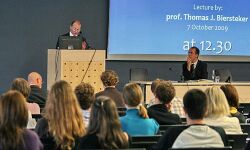Biography:Thomas J. Biersteker
Thomas J. Biersteker | |
|---|---|
 Thomas J. Biersteker giving lectures on the work of the UN Secretariat and governments on targeting sanctions, global governance and on challenges facing the UN Peace Building Commission. | |
| Professor at Graduate Institute of International and Development Studies | |
| Assumed office July 2007 | |
| Director of Watson Institute for International and Public Affairs, Brown University | |
| In office 1994–2006 | |
| Preceded by | Vartan Gregorian (acting director of Watson Institute for International and Public Affairs after the death of Howard Swearer, president of Brown University) |
| Succeeded by | Barbara Stallings |
Thomas J. Biersteker (born May 2, 1950) is an American political scientist and a notable constructivism scholar. He became the first Curt Gasteyger Professor of International Security at the Graduate Institute of International and Development Studies (IHEID) in Geneva, Switzerland in 2007, where he is also a member of the Centre on Conflict, Development and Peacebuilding.[1] He is an active member of the Council on Foreign Relations and the Social Science Research Council and is on the Editorial Board of Stability: International Journal of Security and Development.[2] His more recent work included advising the United Nations ’ Secretariat and the governments of Switzerland, Sweden and Germany on the design of targeted sanctions.[citation needed]
Education
Biersteker received a PhD from the Massachusetts Institute of Technology, Department of Political Science in February 1977, from where he had received an M.S. in February 1975. His A.B. degree was from the University of Chicago, Public Affairs Program in June 1972. His PhD dissertation won the 1978 Helen Dwight Reid Award from the American Political Science Association for best dissertation in International Relations.[3]
Career
Prior to the Graduate Institute, he served as Director of the Watson Institute for International Studies at Brown University from 1994 to 2006. He was the Olive C. Watson Professor of International Studies at the Watson Institute for International Studies, and earlier the Henry R. Luce Professor of Transnational Organizations in the Department of Political Science at Brown University, from 1992-2006.[4] He was a professor at the School of International Relations, University of Southern California from 1985–1992, where he was founder and Director of the Center for International Studies. He was an associate professor in the Department of Political Science at Yale University, where he taught from 1976-1985.
Research
Biersteker's research interests focus on governance, the history of international relations, international political economy, sanctions, international organizations, diplomacy, peacekeeping, state-building and terrorism.
He has written or co-authored a dozen scholarly books, including the following:
- Argument without End: In Search of Answers to the Vietnam Tragedy with Robert McNamara (8th United States Secretary of Defense), James G. Blight, Robert K. Brigham, and Col. Herbert Y. Schandler (New York: PublicAffairs Press, 1999)[5]
- Countering the Financing of Global Terrorism with Sue Eckert (New York and London: Routledge Publishers, ISBN:978-0-415-39643-1, 2007),
- The Emergence of Private Authority in Global Governance, with Rodney B. Hall (Cambridge: Cambridge University Press, 2002),
- State Sovereignty As Social Construct, with Cynthia Weber (Cambridge: Cambridge University Press, 1996),
- Distortion or Development? Contending Perspectives on the Multinational Corporation (Cambridge, MA: The MIT Press, 1978).
He has written many peer-reviewed journal articles, book chapters, and policy papers. Among the more influential are:
- "The “Peculiar Problems” of Scholarly Engagement in the Policy Process," International Studies Review (2008),
- "A Comparative Assessment of Saudi Arabia with other Countries of the Islamic World," published in An Update on the Campaign Against the Financing of Terrorism, New York: Council on Foreign Relations (2004),
- "Reducing the role of the state in the economy: a conceptual exploration of IMF and World Bank prescriptions" in International Studies Quarterly (1990), *"Critical Reflections on Post-Positivism in International Relations," International Studies Quarterly (1989),
- "The Dialectics of World Order: Notes for a future archaeologist of international savoir faire," co-authored with Hayward R. Alker, Jr., International Studies Quarterly (1984).
References
- ↑ "Biersteker". http://graduateinstitute.ch/directory/_/people/biersteker.
- ↑ "Membership Roster - Council on Foreign Relations". 2010-08-31. Archived from the original on 2010-08-31. https://web.archive.org/web/20100831093806/http://www.cfr.org/about/membership/roster.html?letter=B.
- ↑ "Thomas J. Biersteker CV". graduateinstitute.ch. https://web.archive.org/web/20121002001843/http://graduateinstitute.ch/webdav/site/admininst/shared/iheid/800/biersteker/CV%20Thomas%20Biersteker.pdf. Retrieved 27 November 2016.
- ↑ "Thomas Biersteker to Step Down as Watson Institute Director in 2006 :…". archive.is. 2013-04-16. https://archive.is/20130416022837/http://www.watsoninstitute.org/news_detail.cfm?id=345.
- ↑ "Why Were We in Vietnam?". https://www.nytimes.com/books/99/08/08/reviews/990808.08matlot.html.

